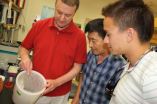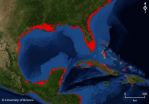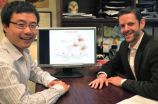(Press-News.org) BOSTON—Nursing home residents taking certain antidepressant medications are at an increased risk of falling in the days following the start of a new prescription or a dose increase of their current drug, according to a new study by the Institute for Aging Research of Hebrew SeniorLife, an affiliate of Harvard Medical School.
Published online in the Journal of Gerontology: Medical Sciences, the study found that nursing home residents have a fivefold increased risk of falling within two days of a new prescription for or an increased dose of a non-SSRI (selective serotonin reuptake inhibitor) antidepressant such as bupropion or venlafaxine. The findings suggest that nursing home staff should closely monitor these residents following a prescription change to prevent potential falls.
"Our results," says lead author Sarah D. Berry, M.D., M.P.H., a scientist at the Institute for Aging Research, "identify the days following a new prescription or increased dose of a non-SSRI antidepressant as a window of time associated with a particularly high risk of falling among nursing home residents."
The risk of falls, she says, may be due to acute cognitive or motor effects that have not yet been fully investigated. Certain non-SSRIs, such as trazodone, can cause postural hypotension, a dramatic decrease in blood pressure upon standing that may contribute to falls. Other non-SSRIs, like venlafaxine, can cause sedation and coordination problems that may lead to falls.
According to some estimates, more than one-third of the country's nearly 1.6 million nursing home residents take some type of antidepressant medication. Several previous studies have implicated antidepressants, including both SSRIs, such as paroxetine and sertraline, and non-SSRIs, as a risk factor for falls, especially among older adults; however, it is unclear if the risk accrues during the duration of use or if there are acute risks associated with the initiation or change in dose of a prescription.
Both tricyclic antidepressants and SSRIs, the most commonly prescribed antidepressant medications, have been associated with up to a sixfold increased risk of falls among nursing home residents in other studies. Newer drugs, including serotonin-norepinephrine reuptake inhibitors, may also be associated with falls risk. Regardless, says Dr. Berry, "these drugs are effective at treating the symptoms of depression, and many clinicians are reluctant to withhold their use based solely on a risk for falls."
Although many studies have examined chronic antidepressant use as a risk factor for falls, few have considered the short-term effects of a change in antidepressant prescription. Dr. Berry's study, called a case-crossover study, examined 1,181 residents of a Boston-area nursing home who fell, comparing the frequency of antidepressant changes during a "hazard" period (1-7 days before a fall) with the frequency of antidepressant changes during a control period (8-14 days before a fall). Information on falls was collected using the facility's federally-mandated computerized incident reports. The risk of falls was greatest within a two-day period of a change in a non-SSRI prescription (either new or existing), while no association was found between SSRIs and falls. The risk of falls diminished each day following the prescription change.
In light of her findings, says Dr. Berry, an instructor in medicine at Harvard Medical School, "nursing home staff should keep a watchful eye on residents in the days following a non-SSRI antidepressant change to prevent falls and clinicians should avoid making changes on weekends or during times when unfamiliar staff is present."
###The study was funded by a grant from the National Institute on Aging, the Hartford Geriatrics Health Outcomes Research Scholars Awards Program, and the Men's Associates of Hebrew SeniorLife.
Scientists at the Institute for Aging Research seek to transform the human experience of aging by conducting research that will ensure a life of health, dignity and productivity into advanced age. The Institute carries out rigorous studies that discover the mechanisms of age-related disease and disability; lead to the prevention, treatment and cure of disease; advance the standard of care for older people; and inform public decision-making.
Founded in 1903, Hebrew SeniorLife, an affiliate of Harvard Medical School, is a nonprofit, nonsectarian organization devoted to innovative research, health care, education and housing that improves the lives of seniors. For more information, please visit www.hebrewseniorlife.org.
Nursing home residents at heightened risk of falling in the days following
Increased surveillance over 48-hour period may decrease falls
2011-07-19
ELSE PRESS RELEASES FROM THIS DATE:
New health-care payment system slows spending while improving patient care
2011-07-19
In a new study with implications for state and federal efforts to reform payments to doctors and hospitals to encourage greater coordination of care, Harvard Medical School researchers found that a global payment system underway in Massachusetts lowered medical spending while improving the quality of patient care relative to the traditional fee-for-service system.
The study, published today in the New England Journal of Medicine, examined the Alternative Quality Contract (AQC), which was first introduced by Blue Cross Blue Shield of Massachusetts (BCBSMA) in 2009 and ...
World's forests' role in carbon storage immense, profound
2011-07-19
Fairbanks, Alaska—Until now, scientists were uncertain about how much and where in the world terrestrial carbon is being stored. In the July 14 issue of Science Express, scientists report that, between 1990 and 2007, the world's forests stored about 2.4 gigatons of carbon per year.
Their results suggest that forests account for nearly all of the world's land-based carbon uptake. Boreal forests are estimated to be responsible for 22 percent of the carbon stored in the forests. A warming climate has the potential to increase fires and insect damage in the boreal forest ...
Scientists seek to increase science literacy
2011-07-19
Fairbanks, Alaska—A scientist at the University of Alaska Fairbanks and colleague at Emory University are seeking to persuade the National Science Foundation to reevaluate its decision to cancel a program that has placed 10,000 science graduate students in more than 6,000 K-12 public schools across the country.
In an editorial in the July 15 issue of the journal Science, UAF biology professor Richard Boone and Emory University professor Pat Marsteller advocate for developing an enhanced version of NSF's Graduate Science, Technology, Engineering and Mathematics Fellows ...
Making blood-sucking deadly for mosquitoes
2011-07-19
Mosquitoes die soon after a blood meal if certain protein components are experimentally disrupted, a team of biochemists at the University of Arizona has discovered.
The approach could be used as an additional strategy in the worldwide effort to curb mosquito-borne diseases like dengue fever, yellow fever and malaria.
When the researchers blocked a cellular process known as vesicle transport, on which the mosquitoes rely to release digestive enzymes into the gut among other functions, it caused the affected animals to die within two days of blood feeding.
"The idea ...
Rising oceans -- too late to turn the tide?
2011-07-19
Thermal expansion of seawater contributed only slightly to rising sea levels compared to melting ice sheets during the Last Interglacial Period, a University of Arizona-led team of researchers has found.
The study combined paleoclimate records with computer simulations of atmosphere-ocean interactions and the team's co-authored paper is accepted for publication in Geophysical Research Letters.
As the world's climate becomes warmer due to increased greenhouse gases in the atmosphere, sea levels are expected to rise by up to three feet by the end of this century.
But ...
NYU Langone Medical Center's tip sheet to the 2011 Alzheimer's Association International Conference
2011-07-19
NEW YORK, July 16, 2011 – Experts from the Center of Excellence on Brain Aging at NYU Langone Medical Center will present new research at the 2011 Alzheimer's Association International Conference on Alzheimer's disease to be held in Paris, France from July 16 – 21. Of particular interest is the presentation about mild cognitive impairment in retired football players, with Stella Karantzoulis, PhD, and the selected "Hot Topics" presentation about a new experimental approach to targeting amyloid plaques, with Fernando Goni, PhD. Each presentation is embargoed as noted below.
The ...
Newer techniques are making cardiac CT safer for children
2011-07-19
Coronary computed tomography angiography (CTA) has excellent image quality and diagnostic confidence for the entire spectrum of pediatric patients, with significant reduction of risk with recent technological advancements, according to a study to be presented at the Sixth Annual Scientific Meeting of the Society of Cardiovascular Computed Tomography (SCCT) in Denver, July 14-17.
"Traditionally, pediatric patients who require coronary artery imaging have undergone a cardiac catheterization, which is an invasive procedure with a significant radiation dose, requiring sedation ...
NYU researchers develop compound to block signaling of cancer-causing protein
2011-07-19
Researchers at New York University's Department of Chemistry and NYU Langone Medical Center have developed a compound that blocks signaling from a protein implicated in many types of cancer. The compound is described in the latest issue of the journal Nature Chemical Biology.
The researchers examined signaling by receptor tyrosine kinase (RTK). Abnormal RTK signaling is a major underlying cause of various developmental disorders and diseases, including many forms of cancer. RTK signaling pathway employs interactions between proteins Sos and Ras, and accounts for a broad ...
Researchers provide means of monitoring cellular interactions
2011-07-19
Boston, MA – Using nanotechnology to engineer sensors onto the surface of cells, researchers at Brigham and Women's Hospital (BWH) have developed a platform technology for monitoring single-cell interactions in real-time. This innovation addresses needs in both science and medicine by providing the ability to further understand complex cell biology, track transplanted cells, and develop effective therapeutics. These findings are published in the July 17 issue of Nature Nanotechnology.
"We can now monitor how individual cells talk to one another in real-time with unprecedented ...
What keeps the Earth cooking?
2011-07-19
What spreads the sea floors and moves the continents? What melts iron in the outer core and enables the Earth's magnetic field? Heat. Geologists have used temperature measurements from more than 20,000 boreholes around the world to estimate that some 44 terawatts (44 trillion watts) of heat continually flow from Earth's interior into space. Where does it come from?
Radioactive decay of uranium, thorium, and potassium in Earth's crust and mantle is a principal source, and in 2005 scientists in the KamLAND collaboration, based in Japan, first showed that there was a way ...
LAST 30 PRESS RELEASES:
Novel camel antimicrobial peptides show promise against drug-resistant bacteria
Scientists discover why we know when to stop scratching an itch
A hidden reason inner ear cells die – and what it means for preventing hearing loss
Researchers discover how tuberculosis bacteria use a “stealth” mechanism to evade the immune system
New microscopy technique lets scientists see cells in unprecedented detail and color
Sometimes less is more: Scientists rethink how to pack medicine into tiny delivery capsules
Scientists build low-cost microscope to study living cells in zero gravity
The Biophysical Journal names Denis V. Titov the 2025 Paper of the Year-Early Career Investigator awardee
Scientists show how your body senses cold—and why menthol feels cool
Scientists deliver new molecule for getting DNA into cells
Study reveals insights about brain regions linked to OCD, informing potential treatments
Does ocean saltiness influence El Niño?
2026 Young Investigators: ONR celebrates new talent tackling warfighter challenges
Genetics help explain who gets the ‘telltale tingle’ from music, art and literature
Many Americans misunderstand medical aid in dying laws
Researchers publish landmark infectious disease study in ‘Science’
New NSF award supports innovative role-playing game approach to strengthening research security in academia
Kumar named to ACMA Emerging Leaders Program for 2026
AI language models could transform aquatic environmental risk assessment
New isotope tools reveal hidden pathways reshaping the global nitrogen cycle
Study reveals how antibiotic structure controls removal from water using biochar
Why chronic pain lasts longer in women: Immune cells offer clues
Toxic exposure creates epigenetic disease risk over 20 generations
More time spent on social media linked to steroid use intentions among boys and men
New study suggests a “kick it while it’s down” approach to cancer treatment could improve cure rates
Milken Institute, Ann Theodore Foundation launch new grant to support clinical trial for potential sarcoidosis treatment
New strategies boost effectiveness of CAR-NK therapy against cancer
Study: Adolescent cannabis use linked to doubling risk of psychotic and bipolar disorders
Invisible harms: drug-related deaths spike after hurricanes and tropical storms
Adolescent cannabis use and risk of psychotic, bipolar, depressive, and anxiety disorders
[Press-News.org] Nursing home residents at heightened risk of falling in the days followingIncreased surveillance over 48-hour period may decrease falls



